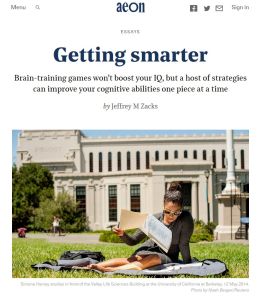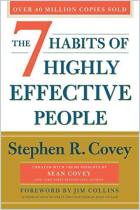
Jeffrey M. Zacks
Getting Smarter
Brain-training games won’t boost your IQ, but a host of strategies can improve your cognitive abilities one piece at a time
Aeon, 2016
What's inside?
Is supercharging your IQ through cognitive training just a pipe dream?
Recommendation
Can you boost your IQ in a quick and easy manner? Psychologist and radiologist Jeffrey M. Zacks of Washington University examines several techniques which purportedly enhance human cognition. Zacks devotes much of his critical analysis to debunking false claims and highlighting risks, but he offers some hope for individuals willing to devote time and effort to cognitive improvement. To the lazy self-improvers, getAbstract recommends heeding the main message: No shortcut will significantly enhance a person’s intelligence. Sorry.
Take-Aways
- Providers of brain-training programs claim their games enhance “working memory” and “attention control,” but evidence suggests the systems don’t boost an individual’s overall cognitive abilities.
- Certain prescription drugs may offer a temporary cognitive boost, but can impair long-term brain development.
- Subliminal cognitive training doesn’t work.
- Electric stimulation can engender “modest” cognitive gains, but the procedure is risky.
- Task-specific cognitive training can help an individual improve in that specific task, and cardiovascular exercise can enhance overall brain function.
Summary
Americans love the promise of easy self-improvement. Consumers looking for a “quick fix” turn to products promising cognitive enhancement. But do any of the techniques work? Subliminal training programs claim that you won’t even realize you’re learning: Hidden messages in a recording will help you, say, study a language while listening to nature sounds or music – even while you are asleep. Alas, it doesn’t work.
“As the pace of life continues to accelerate, there is increasing pressure for a quick fix to boost our cognitive capacities – for study, for work and for recreation. So, is there anything out there that works?”
Similarly, popular brain-training programs that claim to enhance “working memory” and “attention control” don’t actually boost an individual’s overall cognitive abilities. The gaming format of these programs does make acquiring a new skill fun, so people are more likely to persist; and the tasks get more difficult as your skill increases, which also supports learning. However, while these games can help individuals get better at the specific task for which they are training, the skills don’t transfer to other cognitive areas. Just because you get better at playing the game doesn’t mean that you’ll improve at, say, memorizing names.
“Electrical stimulation – at the right dosage with the right technique in the right location – can produce modest enhancement of some kinds of learning and motor function.”
Healthy individuals may experience a cognitive boost through prescription drugs like those used to treat attention deficit hyperactivity disorder. However, the improvement is merely temporary, and cognition may suffer as the drug’s effects wane. Moreover, for younger people, these drugs might impair brain development in the long run.
“We’re already smarter than our grandparents. And if we live an active lifestyle, we can get smarter and stay smart throughout our lives.”
Evidence suggests that electric stimulation – that is, applying electric pulses to encourage activity in certain parts of the brain – can engender “modest” cognitive gains. The procedure is risky though: Injuries, both major and minor, can occur, especially if amateurs do the procedure “outside of a reputable clinic or lab.”
No quick fix will safely, reliably and significantly increase your IQ. Still, if you rigorously commit to learning a specific cognitive skill (like remembering names) and practice regularly, you can improve that particular skill. Also, working out will help: Cardiovascular exercise functionally improves your brain structure and aids the development of new neurons in the brain – thus, making you smarter.
About the Author
Jeffrey M. Zacks is a professor of psychology and radiology at Washington University. His latest book is Flicker: Your Brain on Movies.
This document is restricted to personal use only.
My Highlights
Did you like this summary?
Read the articleThis summary has been shared with you by getAbstract.
We find, rate and summarize relevant knowledge to help people make better decisions in business and in their private lives.
Already a customer? Log in here.
















Comment on this summary
JeanCarloES